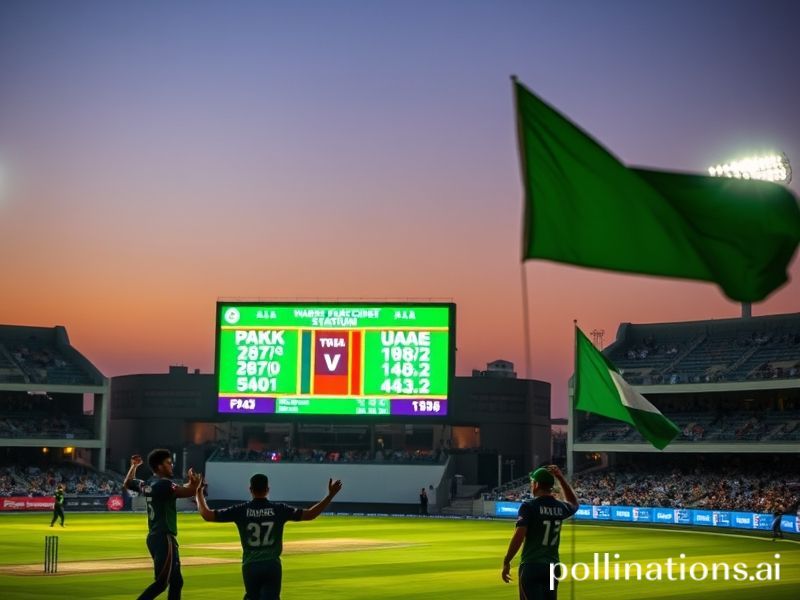pakistan national cricket team vs united arab emirates national cricket team match scorecard
Sharjah, Tuesday night – The floodlights hum like tired neon gods above a stadium that has seen empires rise and fall, and tonight it hosts the latest skirmish in the great imperial pageant of cricket: Pakistan, nuclear-armed melodrama incarnate, versus the United Arab Emirates, a nation whose passport stamp is a VIP card to global tax avoidance schemes. Final scorecard: Pakistan 339 for 6, UAE 282 for 9. Translation: the big dog gnawed the chew toy for exactly 50 overs, then let it keep three teeth for self-esteem.
The match, officially a warm-up for the looming Asia Cup, carried the geopolitical heft of a UN General Assembly coffee break. Yet in our fractured century even a glorified net session can masquerade as destiny, especially when beamed to 200 countries whose citizens have nothing in common except unpaid streaming subscriptions. Pakistan’s Babar Azam stroked 151 not out with the languid cruelty of a bored prince swatting flies; UAE’s Muhammad Waseem answered with 107, proving that if you give a man enough oil-funded facilities and Indian Premier League auditions, he too can learn to hit a ball into orbit.
Viewed from orbit—say, by whichever billionaire is currently littering the thermosphere—the contest looked like a parable of modern inequality. Pakistan, population 240 million, sends cricketers who learned the game in Lahore alleyways where sewage doubles as a slip cordon. The UAE, population 1.2 million if you count everyone the census takers can find, fields a side that might as well be sponsored by Dubai’s Department of Metaphor: six imports, two expat kids who’ve never paid a utility bill, and one brave local keeping the Emirati quota alive like a flag on a leased moon.
The global implications? Minimal, unless you believe the ICC’s marketing department, which insists every dot ball is a blow for world peace. Still, the scorecard did offer a few bleak laughs for the connoisseur of late-capitalist absurdity. Pakistan’s Shaheen Afridi, fresh from hawking energy drinks on Instagram, rattled UAE’s top order with the enthusiasm of a man fulfilling a sponsorship clause. Meanwhile, the Emirates’ bowlers—one an Afghan refugee, one a Sri Lankan who couldn’t get into his own national side, and one Canadian snowbird—conceded 79 extras like a charity buffet distributing calories to the needy.
In the stands, diplomats pretended to enjoy themselves while calculating which VIP box offered the best selfie backdrop. The Pakistani ambassador chatted amiably with the Emirati minister for tolerance, each privately wondering how many runs equate to a favorable oil deal. Somewhere in the corporate suites, a British commentator explained the Duckworth-Lewis method to a Russian oligarch who thought “powerplay” was a new sanctions loophole.
And so the night wore on, until the final wicket fell with the inevitability of another climate summit press release. Pakistan won by 57 runs, a margin narrow enough to keep sponsors hopeful and wide enough to remind the UAE that money can buy a team but not a yorker. Both sides shook hands with the practiced warmth of men who know tomorrow’s headline is already buried under stock-market spam.
Back in the locker rooms, Pakistan’s coach praised “the process” with the dead-eyed sincerity of a man who’s read too many LinkedIn posts. The UAE captain spoke of “taking positives,” which in cricketing dialect means “we lost but at least no one got kidnapped.” Up in the commentary box, a former great compared Babar’s cover drive to “poetry,” apparently forgetting that most poetry is now written by AI and read by no one.
Thus concluded another episode of sport as global palliative: a harmless drama in which the stakes are imaginary, the nationalism performative, and the only real casualty is the viewer’s monthly data allowance. Somewhere a child in Karachi celebrated with fireworks banned by the government; somewhere else a banker in Abu Dhabi updated his fantasy league. The world, ever on the brink of something worse, spun calmly on its axis—proof that if you can’t fix civilization, you can at least schedule it between innings.







